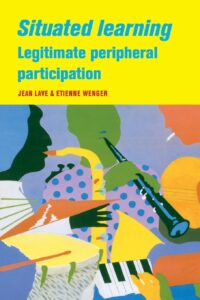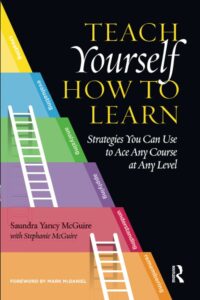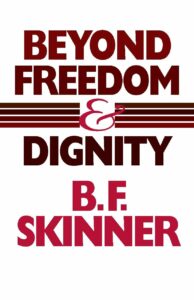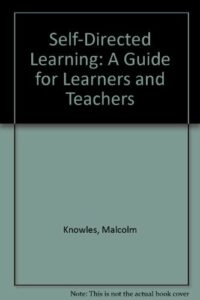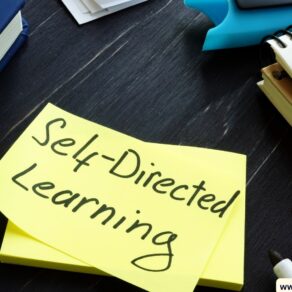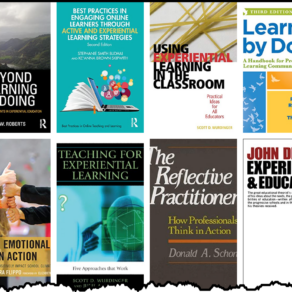In today’s post, I am sharing with you a curated list of must-read books on self-directed learning. Now, this isn’t just a list I whipped up on a whim; it’s a collection deeply influenced by years of experience in education, both as a classroom teacher and as an educational researcher. In fact, a good number of these books crossed my path while I was grinding away on my doctorate in educational studies at Mount Saint Vincent University right here in Halifax, Canada. So you can bet they’re not just informative, but also transformative.
Self-directed learning is a topic that has been near and dear to my heart for years, not just theoretically but in the raw, messy, and beautiful realm of actual teaching. If you’re scratching your head, wondering, “What’s self-directed learning?” I got you. Head on over to my other post where I dig deep into what self-directed learning is all about. This should give you a robust foundation for the books I’m about to recommend.
Books on Self-Directed Learning
Here are our top picks for books on self-directed learning:
1. Learning for Life: Creating Classrooms for Self-Directed Learning by Ronald J. Areglado, R. C. Bradley, Pamela S. Lane
“Learning for Life” tackles the quintessential issue in modern education: how to transition students from passive recipients to active, self-motivated learners. The authors focus on guiding teachers and students through this transformative journey. They argue that the biggest challenge in education is changing the traditional dynamics—from teacher-centered to learner-centered environments.
Drawing upon years of classroom experience and educational theory, the book provides actionable strategies for teachers to foster environments that encourage self-directed, lifelong learning. It resonates with me because I’ve always advocated for giving students more agency in their learning journey. Worth noting is that this book places significant emphasis on the roles of teachers in facilitating this change, making it an essential read for educators aiming for more student autonomy in the classroom.
Buy Learning for Life on Amazon
2. Learning in Adulthood: A Comprehensive Guide 4th Edition by Sharan B. Merriam, Lisa M. Baumgartner
This book is like the ‘holy grail’ for anyone diving into adult education. Updated to its 4th edition, “Learning in Adulthood” explores a myriad of factors influencing adult learning, from sociological and philosophical perspectives to psychological theories.
It delves into the social context surrounding adult learners and highlights varied learning theories such as self-directed and transformational learning. This all-inclusive guide is perfect not only for those already familiar with adult education but also for newcomers.
While the book is dense, its segmented organization allows for digestible reading. In my experience, the notion that adult learning requires a nuanced approach separate from general pedagogy is often overlooked. The authors do a stellar job emphasizing this distinction and providing thorough insights based on academic research and practical applications.
Buy Learning in Adulthood on Amazon
3. The Meaning of Adult Education by Eduard Christian Lindeman
“The Meaning of Adult Education” by Eduard Christian Lindeman is a thought-provoking read that challenges conventional educational paradigms. Lindeman places education within the broader context of life experiences and philosophies, arguing that true learning stems from real-world engagement rather than academic formalities.
I find this viewpoint to be both liberating and grounding. It correlates with the challenges I faced as an adult learner, as formal education often felt disconnected from real-world applicability.
The book sheds light on how education can be integrated into the very fabric of our daily lives, particularly for those in various occupations and industries. It offers a compelling argument that education should be personalized, springing from the lived experiences of adults. Lindeman’s perspective is not just academic; it’s deeply rooted in his own life experiences, making it relatable and authentic.
Buy The Meaning of Adult Education on Amazon
4. Philosophical Foundations of Adult Education 3rd Edition by John L. Elias and Sharan B. Merriam
If you’re looking to dig deep into the theoretical underpinnings of adult education, this book is your go-to resource. The authors offer a panoramic view, discussing seven different philosophical approaches ranging from liberal to postmodern. What I find particularly valuable is how each chapter has been updated to reflect recent developments in fields like phenomenology and feminist educational theory.
This level of detail offers a nuanced understanding of adult education’s philosophical roots. I appreciate that the authors aren’t pushing one doctrine over another but provide a balanced, historical grounding for each. I have found that having a robust theoretical foundation can make all the difference in my own research and educational approach.
Buy Philosophical Foundations of Adult Learning on Amazon
5. Situated Learning: Legitimate Peripheral Participation by Jean Lave and Etienne Wenger
The notion that learning is not an isolated cerebral activity but a socially-rooted one is thoroughly discussed in this game-changing book. Lave and Wenger introduce the idea of “legitimate peripheral participation,” a concept that captures the trajectory of learning within a community of practice. While the examples range from midwives to butchers, the insights can be applied broadly, even in tech-focused learning communities.
This book feels like a must-read for anyone looking to explore learning as a shared venture. When I first delved into it, it drastically altered how I thought about learning and motivated me to consider more community-focused pedagogical strategies.
Buy Situated Learning on Amazon
6. Self-direction in Adult Learning: Perspectives on Theory, Research and Practice by Ralph G. Brockett and Roger Hiemstra
Ah, self-direction, a topic close to my heart! Originally published in 1991, this book remains highly relevant. It offers a comprehensive look at self-directed learning—both as an instructional method and as an aspect of adult personality. The book serves as a synthesis of multiple perspectives, presenting strategies to facilitate self-directed learning. When it comes to adult learners, the ability to direct one’s learning becomes a vital skill, and this book offers actionable ways to develop that.
The practical advice intertwined with robust theories makes this book a rich resource. I’ve always believed that fostering self-directed learning can yield lifelong benefits, not just academic ones, and this book offers substantial evidence to back that up.
Buy Self-direction in Adult Learning on Amazon
7. Self-Direction for Lifelong Learning: A Comprehensive Guide to Theory and Practice by Philip C. Candy
In “Self-Direction for Lifelong Learning,” Philip C. Candy delivers a scholarly work that thoroughly explores the roots and implications of self-directed learning. He argues that self-directed learning isn’t a trend but a deeply rooted educational philosophy. If you’ve ever found yourself involved in debates or research around personalized learning pathways, this book gives you the academic grounding to back your points.
The book traces the history of self-directed learning and its applications across different educational settings. It’s like a roadmap for anyone in the education sector interested in the mechanics of learning autonomy. When I first read this, it was almost like a validation of the gut feeling many of us educators have—that giving learners more control can facilitate deeper and more meaningful learning experiences.
Buy Self-Direction for Lifelong learning on Amazon
8. Teach Yourself How to Learn by Saundra Yancy McGuire
Saundra McGuire’s book is a game-changer for anyone interested in improving their learning processes, not just for students but also for educators. If you’ve ever heard a student say, “I studied so hard but still did badly,” this book might offer some much-needed clarity. It outlines practical strategies and tips on mastering the art of learning.
This is not just a theoretical approach but a highly actionable guide, complete with real-world anecdotes and interactive exercises. McGuire emphasizes the concept of metacognition—knowing how to think about your own thinking. That struck a chord with me because, in my experience, learning how to learn is often the missing link in our educational system. Concepts like Bloom’s Taxonomy, the differences between fixed and growth mindsets, and even brain science topics like rest and nutrition come into play here.
Buy Teach Yourself How to Learn on Amazon
9. The Adult Learner by Malcolm S. Knowles, Elwood F. Holton III, Richard A. Swanson
Malcolm Knowles’ “The Adult Learner” is often considered the definitive text on adult learning theory or andragogy. The book is a thorough examination of how adults learn differently from children and why their life experiences significantly influence their learning processes. Knowles’ groundbreaking theories from the 1970s still serve as the bedrock for contemporary adult education.
The new 9th edition comes with updated content and additional chapters that focus on online adult learning and diversity and inclusion. It serves as both a textbook and a practical guide. For me, this is the kind of resource you keep within arm’s reach whenever you’re crafting curriculum for adult learners.
Buy The Adult Learner on Amazon
10. Beyond Freedom and Dignity by B.F. Skinner
Skinner’s “Beyond Freedom and Dignity” is provocative and contentious but seminal. If you’ve ever grappled with the tension between individual autonomy and the systemic forces that shape human behavior, this book will give you a lot to think about.
Skinner argues that to solve the world’s problems, we have to look beyond our traditional notions of freedom and dignity and focus more on environmental factors that can be manipulated to affect human behavior.
It’s an unsettling thesis, suggesting we might need to surrender some of our most cherished beliefs for the greater good. However, Skinner’s argument is built on years of experimental analysis, and whether you agree or not, the book will challenge your thinking. In my view, Skinner’s work invites us to be more critical and deliberative about the kind of learning environments we create, especially in a world increasingly shaped by technology and data analytics.
Buy Beyond Freedom and Dignity on Amazon
11. Toward a Theory of Instruction by Jerome Bruner
Ah, Jerome Bruner! I can’t say enough about how groundbreaking his work has been for educational psychology and pedagogy. Bruner delves deep into how children learn and how educational systems can be improved to nurture that natural learning process. He calls for a more structured theory of instruction, dismissing the prevailing “body of maxims” as insufficient.
He takes his cues from theories of intellectual growth and essentially tries to create a “user guide” for the human brain in an educational context.
Buy Toward a Theory of Instruction on Amazon
12. The School and Society by John Dewey
If you’ve been in the field of education and haven’t bumped into John Dewey, it’s like being a musician and not knowing The Beatles. Dewey is an education philosopher for the ages. His “The School and Society” is more relevant today than ever, especially when we’re grappling with how to make education more responsive to societal needs.
Dewey argues that school shouldn’t just be a factory for churning out workers; it should be a microcosm of society itself, educating kids in a way that makes them constructive members of their communities.
Buy The School and Society on Amazon
13. Experiential Learning by David Kolb
David Kolb built on Dewey’s foundations and took it a step further, emphasizing the experiential aspect of learning. According to Kolb, the best learning happens when it’s built on real-life experiences. This doesn’t necessarily mean “on-the-job” training, but rather all forms of learning where experience and reflection play major roles.
One thing I find intriguing in Kolb’s book is how he categorizes different learning styles and links them to various academic disciplines. It provides a kind of taxonomy that educators can use to customize their teaching strategies.
Buy Experiential Learning on Amazon
14. Experience And Education by John Dewey
Dewey’s ‘Experience and Education’ is almost a rite of passage for anyone delving into educational theory. It gives a full-circle view of how Dewey, the man himself, revisited his own theories years after initially setting them forth.
This book seems particularly relevant in today’s discourse about hands-on, experiential learning. It’s not just about transferring information from the teacher to the student; it’s about the holistic formation of the individual. I always thought Dewey was kind of the Steve Jobs of educational philosophy—always rethinking, evolving, and never quite satisfied with the status quo. For more on this book, check out Experience and Education review post.
Buy Experience And Education on Amazon
15. The Self-Directed Learning Handbook by Maurice Gibbons
This one caught my eye because of its radical focus on self-directed learning. Given the way edtech tools are making inroads into personalized learning, the handbook’s focus on empowering the student to take charge of their own learning journey is very timely. The concept of ‘action contracts’ sounds fascinating.
They remind me of the goal-setting discussions I’ve seen in more progressive classrooms, where kids outline what they’d like to achieve and how they plan to get there. Very action-oriented, and exactly what education needs to be in this day and age. It resonates with Gibbons’ other works which highlight the necessity for real-world applicability in educational settings.
Buy The Self-Directed Learning Handbook on Amazon
16. Pathways of Adult Learning by Janet Groen and Colleen Kawalilak
Groen and Kawalilak have managed to do something fascinating: They’ve woven in narratives with the theoretical stuff. For someone who’s dabbled in both classroom teaching and educational research, I find this approach compelling. It’s not just academic theory; it’s lived experience. That’s what teaching and learning should be, right?
A blend of what we know theoretically and what we’ve learned by getting our hands dirty in the classroom. Janet Groen has explored adult education’s philosophies in her other works too, and this book feels like a practical culmination of those theoretical viewpoints.
Buy Pathways of Adult Learning on Amazon
17. Freedom to Learn by Carl R. Rogers and H. Jerome Freiberg
Talk about a transformative approach to education! ‘Freedom to Learn’ has always been a game-changer, and the latest edition appears to be no different. It throws a gauntlet at traditional educational systems, advocating for a learner-centered approach.
This book is very much in line with the type of teaching that gets students to engage deeply and take ownership of their learning. Rogers’ influence on educational psychology is undeniable, and this book echoes a lot of what you’ll find in educational psych journals like ‘Educational Psychologist.’
Buy Freedom to Learn on Amazon
19. Self-directed learning: A guide for learners and teachers by Malcolm Shepherd Knowles
This one is a classic in the realm of adult learning. Malcolm Shepherd Knowles pretty much wrote the book on andragogy, the science of adult learning. When I first read Knowles, it opened up an entirely new perspective on how adults engage with learning, which is so different from pedagogy, the way children learn. You know how in the professional development seminars we’ve all been to, the best ones are when they treat teachers like the professionals they are? That’s andragogy in action.
Buy Self-Directed Learning on Amazon
20. Understanding and Facilitating Adult Learning by Stephen D. Brookfield
Brookfield’s book is a powerhouse. It not only analyzes the principles but also goes into what actually works in practice. It’s no surprise that this book has won awards; it’s comprehensive yet very grounded. Stephen D. Brookfield has contributed to the ‘Adult Education Quarterly,’ where he talks about how crucial reflective practice is for adult education, and this book seems like an extension of that ethos.
Buy Understanding and Facilitating Adult Learning on Amazon
Final thoughts
We’ve made it to the end of this carefully selected list of books on self-directed learning. These reads have been my allies, offering fresh perspectives and concrete strategies, during my time researching at Mount Saint Vincent University and beyond. From the classroom to the ivory towers of academic research, self-directed learning is more than a buzzword—it’s a game changer.
If any of these titles caught your eye, I strongly encourage you to dive in. Reading them is like having an intense yet deeply satisfying conversation with a mentor you deeply respect. And hey, if you’ve read something amazing on this topic that I didn’t list here, let’s hear it! Share your recommendations on our social media platforms; you know I’m all about that community knowledge-sharing.
Before I sign off, if you’re looking for the nuts and bolts of self-directed learning, make sure to check out my previous post where I lay it all out in simple, digestible terms. Let’s keep pushing the boundaries, questioning the status quo, and most importantly, fostering a love for learning that is self-directed and lifelong.



